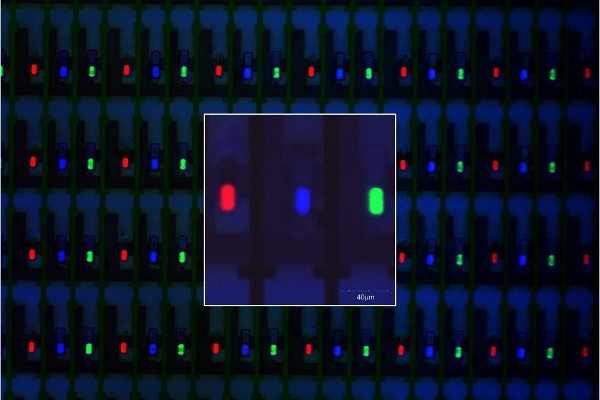
Simon Harris, Minister for Further and Higher Education, Research, Innovation and Science announces €24 million investment in rising research leaders.
The awards, designed to support Ireland’s emerging research talent and to encourage interdisciplinary approaches, will enable postdoctoral researchers to conduct independent research for a four–year period and will provide funding for a postgraduate student who will be primarily supervised by the awardee.
Support for 43 emerging research talents in areas such as AI and vaping, student mental health, hearing children of deaf adults, sustainable cheese manufacturing, virtual reality, climate risk and predictability
Two researchers from Tyndall National Institute received funding from Science Foundation Ireland (SFI) the Irish Research Council (IRC) under the pathway programme.
Tyndall's award-winning researchers are
Dr Zhi Li, Senior Researcher, Photonics, IPIC at Tyndall

Monolithic Integration with Pyramidal MicroLEDs:
Bringing AR/VR Displays into Reality (MICROBAR) €563,335.60 Micro-light-emitting diodes (micro-LEDs) spanning blue, green and red emissions with high efficiency and brightness are highly desired for virtual/augmented reality (VR/AR) applications. However, the current approach for device fabrication leads to significant efficiency drop for small devices, in particular for traditional red micro-LEDs based on AlGaInP, which hinders the advance of applications mentioned above. In this proposal, we aim to achieve highly efficient red micro-LEDs based on InGaN materials via epitaxial growth on semi-polar planes of GaN pyramids. These directly grown pyramid micro-LEDs, benefiting from a variety of advantages such as significantly reduced polarization fields on semi-polar planes, higher light extraction efficiency and the damage-free epitaxy process, are expected to emit native and bright red light, which will be ground-breaking technologies for the displays if successful. Moreover, by adding InGaN-based blue and green micro-LEDs growth to the same chips, we aim to demonstrate monolithically integrated RGB micro-LED structures in the same wafer. Compared to the conventional hybrid integration process, this integration approach in the epitaxy level based on only InGaN materials will enable higher resolution and brightness, and lower production cost for microdisplays. These technologies will pave the pathway toward ultrahigh definition displays for VR/AR applications.
Dr Alexander Jaeger, Lecturer School of Engineering UCC and Researcher, Micro and Nano Systems Centre at Tyndall
 WiMag
WiMag
Wireless Magnetic Tracking for Collaborative Environments €530,580.60 Motion capture systems measure the motion of people and objects in 3D space and are widely used in film production, engineering, virtual reality and medicine. The market leading motion capture systems use optical techniques to measure light from a subject in order to track its position and orientation in space. However, the underlying principles of optical motion capture make these systems prone to tracking errors due to line of sight constraints; Optical systems can malfunction in scenarios where multiple subjects are tracked or if obstacles in the environment break the line of sight between the subject and optical measurement unit. Magnetic tracking technology serves as an alternative tracking method that does not require line of sight to be maintained. Existing magnetic motion tracking systems are large, bulky wired devices making them unsuitable for many motion tracking applications in which optical methods are often preferred. WiMag addresses these shortcomings by developing a novel wireless magnetic motion tracking system suitable for multi-user motion capture applications. The proposed system has the potential to radically shape the future of virtual reality by enabling the tracking of multiple subjects in a common environment.
Marking the new investment, Minister for Further and Higher Education, Research, Innovation and Science Simon Harris, TD, said:
“I am pleased to announce funding for critical research projects spanning a broad range of areas across science, technology, engineering, maths, arts, humanities and social sciences.
“I am particularly pleased to see we are researching the area of vaping and the impact it is having on the next generation of smokers. I believe the impact is significant and I am really looking forward to hearing the outcome of that work. There is also invaluable research into student mental health and wellbeing across the island of Ireland.
“By supporting this activity, we are cultivating generational talent within Ireland’s research and innovation ecosystem that is focusing on key challenges and opportunities and on the issues facing this generation such as climate and technology.”
The 43 research projects will be funded through 13 research bodies, as follows: Trinity College Dublin (7); University College Dublin (7); Dublin City University (1); Tyndall National Institute (2); Maynooth University (2); RCSI University of Medicine and Health Sciences (4); University of Galway (6); University of Limerick (3); University College Cork (4); Dublin Institute for Advanced Studies (3); Teagasc (2); Technological University Dublin (1); Atlantic Technological University (1).
Congratulations to all!
